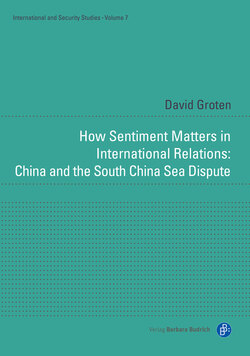Читать книгу How Sentiment Matters in International Relations: China and the South China Sea Dispute - David Groten - Страница 13
На сайте Литреса книга снята с продажи.
2.1.1 Respect: Definitions, Related Concepts and Implications
ОглавлениеOriginally, respect (lat. respicere) is a concept rooted in social psychology and philosophy. It first and foremost involves the subjective perception of an individual human being’s self and its role in society. Thus, it concerns the relationship between an individual actor’s self-esteem, status, normative moral/social beliefs and the perceived acknowledgment by others of the expectations derived thereof. In this vein, the assessment of respectful behavior by a respect granting actor vis-à-vis a respect receiving actor serves as an [25] indicator of the latter’s social standing and social significance. Status concerns and an actor’s desire to maintain (or enhance) social standing constitute fundamental elements of respect. Naturally, these concerns are driven by status-related expectations, essentially the belief that self-ascribed status conception entitles oneself to corresponding external recognition thereof by others. To put it differently, other actors are expected to properly acknowledge one’s self-perceived social standing and self-worth18. Possible avenues for such acknowledgment encompass verbal manifestations, gestures, symbols and actual deeds.
Against this backdrop, respect shall hereinafter be understood as an attitude by others manifested in words, gestures or deeds perceived as adequate to one’s self-evaluated self-worth and social standing. In turn, if an actor perceives certain external attitude to be an inadequate confirmation thereof instead, disrespect is the anticipated result (Dillon, 2007, 2010). In other words, disrespect shall be understood as the result of a vacancy or vacuum between an actor’s subjective respect expectations and other parties’ actual behavior and attitudes.
